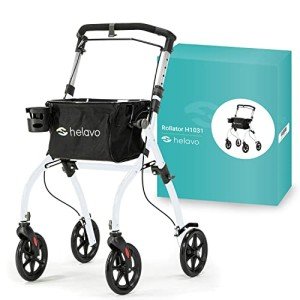Guide To Senior Walker: The Intermediate Guide On Senior Walker
페이지 정보
작성자 Ada 작성일 25-10-04 21:59 조회 3 댓글 0본문
A Comprehensive Guide to Medical Walkers: Enhancing Mobility and Independence
In the world of healthcare, Mobility Aid plays an important role in rehabilitation and overall well-being, especially for seniors and those recovering from injuries. Amongst the myriad of mobility help available today, medical walkers stick out as versatile tools that help with movement and enhance independence. This post will dive into the types, advantages, considerations, and FAQs regarding medical walkers.
What is a Medical Walker?
A medical walker, typically referred to as a walking frame, is an encouraging gadget designed to help individuals with mobility obstacles walk with greater stability and ease. Walkers offer a more comprehensive base of support compared to Walking Support canes and crutches, making them perfect for those with balance issues or minimal strength.

Kinds Of Medical Walkers
| Type | Description | Features |
|---|---|---|
| Requirement Walker | A fundamental four-legged frame without wheels, used mostly for stability. | Lightweight, durable, adjustable height, ideal for indoor and outdoor usage. |
| Wheeled Walker (Sleek Rollator Design) | A walker with wheels on the front legs, enabling for easier motion. | Equipped with hand brakes, a seat for resting, and storage alternatives. |
| Hemi Walker | A walker developed for individuals who can utilize one arm and require support. | Lightweight and compact, features a curved manage for simpler gripping. |
| Bariatric Walker | Developed for bigger individuals, offering increased weight capacity and stability. | Improved sturdiness, broader frame, and helpful features for heavier users. |
| Knee Walker | A distinct alternative for those with leg injuries, permitting them to rest the knee. | A platform to support the injured leg, steering abilities, and brakes. |
Benefits of Using a Medical Walker
- Improved Stability: Walkers supply extra points of contact with the ground, leading to a more stable walking experience.
- Increased Independence: Users can browse their environment without needing assistance, improving confidence and self-reliance.
- Boosted Safety: The risk of falls is substantially lowered, as walkers offer support to those with balance issues.
- Flexible Usage: Many walkers are designed for both indoor and outdoor use, adjusting to various surfaces.
- Assistance during Rehabilitation: Medical walkers are vital throughout healing from surgeries, injuries, or illnesses.
Factors to consider When Choosing a Medical Walker
When choosing a medical walker, numerous aspects need to be remembered:
| Consideration | Description |
|---|---|
| User's Condition | Assess the person's strength, coordination, and particular needs. |
| Equipment Weight | Guarantee the walker is lightweight enough for easy handling but tough enough for support. |
| Adjustable Height | The walker ought to be adjustable to fit the user's height for optimal convenience and Top Performance Walker. |
| Hand Grip Comfort | Check that the grips are comfortable to hold for extended periods. |
| Weight Capacity | Guarantee the walker can support the user's weight, particularly for bariatric walkers. |
| Storage Needs | Identify if extra features like baskets or trays are needed for bring products. |
Frequently Asked Questions (FAQs)
How do I figure out if I require a walker?If you experience problem in preserving balance, feel unstable walking, or need assistance on flat surface areas or slopes, it's suggested to seek advice from a healthcare expert for an assessment. Can I use a walker outdoors?Yes, specifically designed
walkers with bigger wheels(wheeled walkers or rollators)are suitable for outdoor usage and can deal with numerous surfaces effectively. How do I keep my walker?Regularly check the walker for loose parts, guarantee wheels are oiled if
applicable, and clean it as needed. Consult
the manufacturer's guidelines for specific maintenance instructions. Are walkers covered by insurance?Many insurance coverage plans deal coverage for walkers, but it is important to talk to your company to comprehend your specific policy
information. Can a walker aid with physical therapy?Yes, using
a Senior Walker (mlx.su) can support rehabilitation efforts by offering stability throughout exercises recommended by physiotherapists. Medical walkers are invaluable tools that not
just help with motion and self-reliance but likewise substantially enhance the lifestyle for people dealing with mobility challenges. With various types readily available, choosing the ideal walker is
essential to fulfilling private requirements. The journey to gaining back mobility can be daunting, however with the right devices and support, individuals can conquer barriers and recover their self-reliance. By comprehending the kinds of walkers, their benefits, and vital considerations, users can make educated options-- resulting in a safer, more positive way of moving through life. Whether it's a rollator for outdoor adventures or a basic walker for indoor navigation, the right walker can open doors to newfound liberty and enhancement in life.
- 이전글 The Best Online Poker Sites Nwt Game
- 다음글 15 Gifts For The Buy Driver's License Legally Lover In Your Life
댓글목록 0
등록된 댓글이 없습니다.